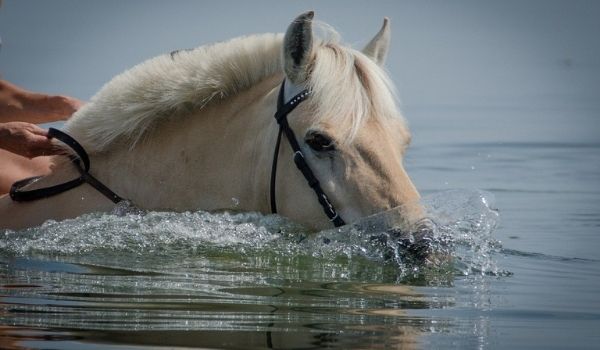Look outside your window, see the sun? It’s summer flying by. Have you done everything on your summer checklist? Is swimming with your horse on it?
Horse owners who live close to a beach or pond definitely have it on their summer bucket list. But can horses swim? Horses and water, is it a good combination?
This thought may keep some, especially those who have recently brought a horse home, at bay from water. You’ll get to know everything about horses and swimming in this article.
Can Horses Swim?
The answer is: Yes, horses can indeed swim, and they already know how to do it without being taught! Horses have a natural instinct to swim, they are born with it. In fact, they are actually very competent swimmers. Their huge body, with most of its barrel filled with lungs and loops of the intestine that contain gas and air-filled fiber as well as liquid, enables them to float naturally.
When they hit deep water, they readily perform a paddle-like action, not too dis-similar from a trotting action but not very high in the water. In fact, a swimming horse’s head is just able to get above water, and the rest of its body remains under the surface.
However, they do have enough buoyancy to support a rider, so long as the rider allows them to keep moving through the water. The horse propels itself forward by moving its legs. A horses’ natural ability to swim is necessary for its survival.
How Do Horses Swim?
When in deep water, horses, like many other mammals, have a natural urge to swim. This ability is said to date back to the days when they lived in the wild and needed to cross rivers to avoid danger or access new pastures. It was just a normal part of their movements in nature.
A horse’s body will stay afloat as long as it continues forward motion, and it will instinctively elevate its head above the surface to breathe. To maintain balance and stability in the water, the legs will always move in a paddle-like motion.
Swimming is physically exhausting for a horse due to the natural resistance provided by water, and it is normal for them to breathe heavily and have an increased heart rate during this sort of activity.
It’s important to note that horses can’t hold their breath the way humans can. This means that if the horse’s head falls into the water, there is a significant risk of drowning. Therefore, it’s necessary not to rush the process of acclimating a horse to water and swimming.
When a horse is swimming, it is crucial to let it do what feels natural in the water and not to interfere with its movements.
Do Horses Like to Swim or Are They Afraid of Water?
Horses, like humans, are individuals, and just because they have a natural instinct to swim when they get into deep water doesn’t imply they enjoy it. The level of comfort varies from horse to horse. Each horse is unique, and while some horses enjoy swimming, others may not. Some will jump right in, while others may be wary and hesitant. It can take time and tolerance to accustom a horse to swimming.
Here are a few reasons why some horses would not want to go in the water.
Limited Depth Perception
Horses, like many predated animals, have eyes on the side of their heads and have a limited field of depth perception, thus, wading into water is essentially like walking into the unknown. This is a frightening experience for your horse, but there’s no reason why it won’t gain confidence if you’re patient with it and slowly introduce it to the water.
Bad Experience
If your horse has had a traumatic encounter with water, especially open water, in the past and associates it with something negative, it may be afraid of swimming. Giving your horse time to realize that the water isn’t going to hurt can help overcome this.
Don’t Like Getting Wet
Some horses, believe it or not, do not enjoy getting wet! They, like some dogs, cats, and other animals, simply loathe the sensation. This is more difficult to overcome, but by feeding your horse lots of treats, you can help distract it from the fact that it’s wet. Carrots, by the way, are a favorite of theirs!
There’s usually a reason why horses don’t like to swim, and if you can figure out what it is, you can usually encourage your horse to overcome its hate for water.
Recommendations
It is surely achievable to help a horse in transitioning from a shivering wreck to a poised superhero fearlessly taking on the sea! The key is to take little, consistent steps to acclimate the horse to water in a familiar and safe environment while demonstrating that it is not unsafe. Allow it to become acquainted with sensations, such as getting wet, hearing waves, smelling the ocean, and other water-related sensory experiences. The key to gaining confidence is to do it gradually.
What Is a Horse’s Fascination With Swimming?
Water fascinates a lot of horses. They may paw at the water, roll in the shallow ends, or even blow bubbles. Since horses are individuals, there is no such thing as a “one-size-fits-all” answer to whether horses fancy swimming or not. While some horses do enjoy swimming, others are less enthusiastic.
Recommendation
“If your horse needs to roll before or after swimming, don’t be startled. If it starts digging with its hoof in the ground while bending its head, it’s a strong sign of what’s to come. Bring its head back up and move the horse forward by pinching your legs to its sides to stop it from laying down (if you’re still mounted).”
Why do horses paw the water?
Who knows, but they do. Remove tack before allowing your horse near the water, or your tack will be soaked from pawing.
Why do horses roll after swimming?
They like it, we guess. You can try to stop it, bonne chance. And Hey! Take a brush to clean it off if you have to ride back.
Is Swimming Good for Horses? What Are the Benefits of Swimming for Horses?
Swimming has many benefits for horses. Some of them are stated below.
Rehabilitation
Swimming is a great technique to maintain a horse in shape while rebuilding and toning its muscles and strengthening tendons after an injury without requiring the horse to carry their own weight. As a result, many physiotherapy programs involve swimming in equestrian pools.
Any doctor or vet will tell you that swimming is beneficial to all living creatures, and horses are no exception. The horse’s body weight is supported by the natural buoyancy of water, and the muscles and tendons can move freely without being restricted. Swimming can also be used to help in rehabilitation. For leg and tendon injuries, as well as muscular injury, many veterinarians will recommend hydrotherapy. This treatment does not place undue stress on the existing injury and, at the same time, is exercising it, which will aid the healing and recovery process. It is a highly effective form of rehabilitation. This is why many great competition horses employ hydrotherapy as part of their training regimen.
Swimming is an amazing form of aerobic and cardiovascular activity for horses, and it may be used to increase their fitness as well as for rehabilitation.
Training
Swimming is an aerobic workout for horses, just like it is for humans, and it is an excellent way to boost endurance and stamina. The horse’s heart and lungs will be strengthened as a result of regular swimming.
Swimming will assist enhance the range of motion of the limb due to the way horses move in the water. This, in turn, can facilitate the development of flexibility and stride, both very desirable in many equestrian sports. One thing that should be kept in mind about swimming as part of a training routine is that it utilizes muscles normally undesired for horses employed in competitive sports, such as the muscles that hold the head up and over water.
Nevertheless, it’s only a problem if swimming is the horse’s primary or only activity.
Recreational
On a hot summer day, swimming is a fun way to break up a trail ride! Keeping Pet highly advises this if you are comfortable with your horse and know how it reacts to water. Swimming has numerous advantages for horses and is a healthy and enjoyable recreational activity.
Swimming is also a kind of therapy for your horse. Humans and horses alike benefit from aqua therapy, which is a low-impact form of exercise. When combined with groundwork, the majority of horses should witness improvement in their fitness and athletic performance. Aqua therapy is also less likely to cause injury to horses due to its mild impact.
Water exercises train the muscles in a new and different manner, working them from various angles, resulting in increased muscular mass, flexibility, fitness, stamina, and endurance, as well as improved motion within joints. When compared to traditional ways, working a horse in water can result in a stronger, more balanced horse, boosting the capacity of the heart and lungs as well as toning muscles with less chance of injury.
Fitness
Just because it is fun doesn’t mean it can’t help or benefit horses. Swimming is often used to improve and maintain a horse’s level of fitness, endurance, and stamina, but it can also be used to help increase a horse’s flexibility and stride. There are, of course, fun aspects of swimming which shouldn’t be underestimated. It is an excellent bonding practice for you and your horse, and it will assist in enhancing your horse’s confidence and fitness.
Difference Between a Horse Swimming in Freshwater and Saltwater
There is a difference between a horse swimming in saltwater and a horse swimming in fresh water. Since saltwater has a higher density than freshwater, it gives additional buoyancy. As a result, you may observe that your horse swims faster in saltwater than in fresh water. Because of water buoyancy, a horse can float higher in the water. There are, however, other elements to consider, such as such as depth and current.
Can Horses Swim in the Ocean?
Yes, horses can swim in the ocean, and swimming with your horse can be a fantastic experience, but it can also go horribly wrong very quickly.
Here are a few things to ponder upon before taking the dive:
How Deep Is the Water?
You need to check the depth of the water. Is there a drop or is it an even angle? What is the state of the ocean floor? Is it sand, stones, coral, or something else? Consider that while swimming, the horse’s legs may be injured by rough and uneven terrain.
Are There Waves?
Remember that horses can’t hold their breath, so don’t let them swim in the sea if the waves are high enough to knock them over.
Is the Current Strong?
If the current is strong, stay on solid ground or merely tip your feet. It might still be a relaxing break for both of you!
Check Your Surroundings
Are you causing a disturbance on the beach or in the surrounding area? Are people bathing there? Be thoughtful of other people’s feelings.
Rules and Regulations
Are horses authorized, and are they permitted to enter the water? Many public beaches will have prohibitions, so be sure to read the signs carefully.
Remove the Unnecessary Equipment
Remove the saddle and consider using a bit less bridle. Detach any equipment that hinders the horse’s upward mobility, as the horse requires free rein to keep its head above the surface to breathe.
Take Company Along
We would suggest taking company along while going swimming with your horse. Firstly, it is safer to have two or more horses in case something goes wrong. Secondly, since horses are herd animals, convincing a reluctant horse to go into the water is easier if it follows another horse.
Can You Ride a Horse While It Swims?

Can horses swim? Yes, but can you ride a horse while it swims? Well, it is okay to ride a horse while it swims, and it’s quite thrilling to feel its power evolving through the water.
While horses can naturally swim, still we must remember that this is not their natural habitat, and it is crucial to be mindful not to obstruct their movements or get in the way. Make sure you’re not pulling on the rains (if you opt to keep the harness on). Grab the mane for support if you need to grasp on to something. Also, remove the saddle before swimming to allow the horse to move spontaneously.
Swimming is exhausting for horses, so pay attention to them and get them out of the water while they’re still energetic. After you’ve finished, reward it with some snacks and a snooze in the shade.
How Fast Can a Horse Swim & How Long Can They Swim For?
A horse’s speed in the water is nowhere like that of on land, with a maximum swimming speed of roughly 4 kilometers per hour. Swimming burns a lot of energy for horses. In fact, a 10-minute swim can be the equivalent of several miles of cantering!
When estimating how long a horse can swim in open water, there are numerous things to consider. It’s also subjective, depending on the horse in question. Because horses float well, and thanks to their large lungs, they don’t waste a lot of energy attempting to keep their bodies afloat; instead, they use it to propel themselves ahead. When compared to a horse swimming against the current, a horse swimming in calm water can swim for longer periods.
Considering horses have varying fitness levels and abilities, it’s crucial to keep an eye out for indicators of exhaustion in your horse.
Swimming can be exhausting for horses due to the resistance of the water, which is why they should not swim for long periods at once. Moreover, the work they put in during a ten-minute swim is comparable to cantering for miles.
Story time! Back in 2016, Rebel Rover, an Australian Horse, swam for 6.8 miles (11km) off of the Brisbane coast. The five-year-old got tired because it was swimming for a long time. It was in about four meters of water when it got rescued, taking the water police and volunteers 90 minutes. They said it was their most unusual call out for help and somewhat like sheep herding. Before that event, Rebel had a few short 5-10 minutes swimming sessions. Later, it was examined by the vet, he was a bit tired and sore in the muscles, but he coped up well with it all.
Quick Tips While You’re Going for a Swim With Your Horse
Can You Swim?
Your horse most likely can, but can you? If you’re not a great swimmer, don’t take any chances. Even in shallow water, you can have a lot of fun.
Has Your Horse Swam Before?
Is your horse used to swimming? Check with previous owners to see if there were any issues with behavior or poor experiences. Is your horse attracted to waves, motorboats, or other water-based distractions? Gradually introduce your horse to water, particularly the beach with its crashing waves and shifting sand beneath its hooves.
Is the Water Safe?
Numerous ponds in the Northeast have been restricted to humans and animals due to an epidemic of blue-green algae. Before you leave for a swim, find out if there are any health issues in your location.
Is It Okay to Swim Alongside Horses?
Horses are permitted in some areas during specific months of the year, or permission or membership is necessary. Prepare your homework ahead of time to avoid disappointment. Do bring a shovel to clean up after your horse.
Do You Have Companions?
Swimming with your horse alone is not a good idea. Do not go swimming with your horse by yourself!
What’s the Terrain Like?
What will the terrain be like where you’ll be going? Is the riverbank steep? Is the edge of the pond rocky? Consider your horse’s grip. You’ll very certainly have to take off your hoof boots (check with the manufacturer for recommendations since some drain really well). Keep all of your tack and accessories well away from the water.
Don’t Spoil New Headgears
What happened to that vintage hackamore? You might head to the lake in your dandy bridle, but replace it with a synthetic bridle or a hackamore that you don’t care about for swimming. The head of your horse should be free. If you can handle your horse, a halter with some reins will suffice. Bring extra leadlines or reins, as well as a bridle, just in case of trouble. Consider what you’ll do once you’ve gotten out of the water. What if you’re not near your equipment? If you trailered to swim, make sure your trailer is closed and locked while you’re in the water. Place your automobile keys in a secure place. Swimming with your keys (or phone) in your pocket is not a wise idea. It’s a big NO.
Watch Out for Bloodsuckers!
In still water, leeches (bloodsuckers) are common. Other creatures to be aware of include jellyfish in the ocean and snapping turtles in ponds, etc. You’re violating their space, so figure out what’s harmful and what isn’t. Insects may find a wet horse enticing, so carry insect repellent! Ticks love beach grass and practically any wooded area, so keep an eye on yourself and your horse. No matter where you’ve been swimming, you’ll want to thoroughly shower your horse off, otherwise, you might be startled by how your horse smells in a few hours. Rinse the manes and tails well.
Summary
Can horses swim? Yes. Horses can swim and float naturally, and it is certainly possible to swim on horseback. Swimming is also beneficial to horses in terms of fitness and rehabilitation.
Swimming on horseback is a great and unique experience when handled correctly. It’s crucial to keep in mind that a horse’s individual talents vary based on relative elements as well as swimming conditions.
Did you find this article helpful? We hope it helped! Explore our Horse Section further, where we extensively discuss all things equine.





